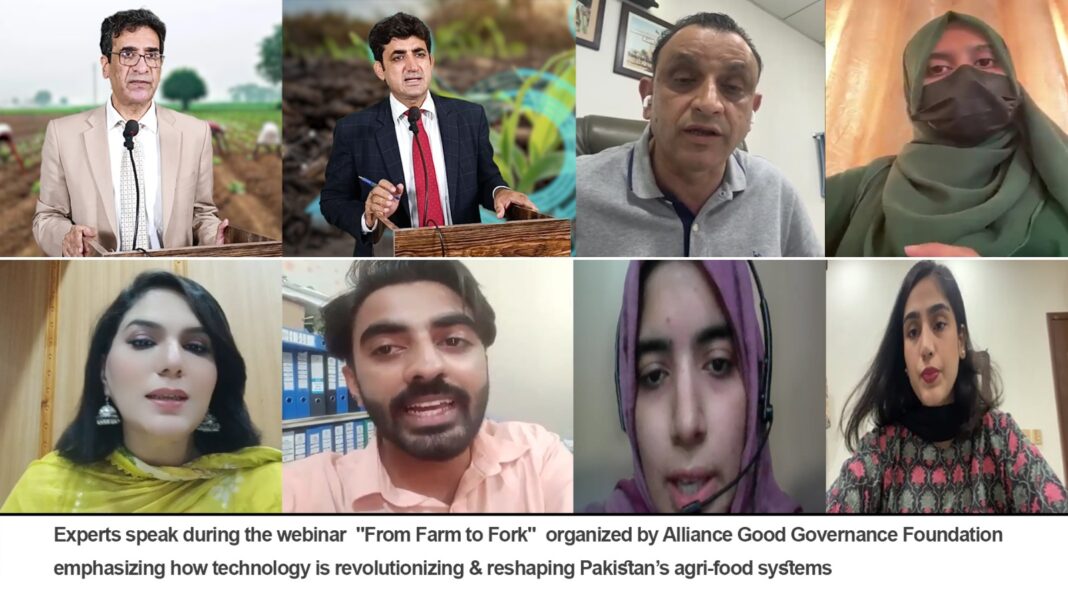 https://twitter.com/home https://www.facebook.com/Shabbir.Hussain191
https://twitter.com/home https://www.facebook.com/Shabbir.Hussain191By Shabbir Hussain
ISLAMABAD, Aug 05 (Alliance News): Technology is revolutionizing the way food is grown, processed, and delivered in Pakistan, with experts saying this transformation is essential for achieving food security and sustainable development.
During a webinar titled From Farm to Fork: Innovations Transforming Pakistan’s Food Processing Sector, organized by the Alliance Good Governance Foundation, agriculture specialists, policy analysts, and medical professionals shared their views on how innovation is shaping the future of food systems in the country.
Experts agreed that technological innovation is changing the food and agricultural landscape rapidly in Pakistan.
They emphasized the urgent need for Pakistan to embrace new technologies such as precision farming, satellite-based monitoring, smart irrigation systems, and genetically resilient crops to combat climate change, improve yield, and enhance food safety.
These advancements are not just helping boost productivity but also reducing the environmental impact of traditional farming practices.
Pakistan’s agricultural sector contributes more than 23% to the national GDP and provides employment to nearly 37% of the country’s labor force.
According to the experts, the sector holds massive potential for modernization, especially through the adoption of digital tools.
These include artificial intelligence (AI), blockchain for supply chain transparency, big data for yield forecasting, and automation in food processing industries.
Speakers highlighted that integrating small-scale farmers into the digital ecosystem is vital. By doing so, post-harvest losses can be minimized, and supply chains can be made more efficient.
Technology can also help connect rural producers with urban markets, improving income levels for farmers and reducing price volatility.
Dr. Tariq Khan, Convenor of the Alliance and keynote speaker at the event, said that innovation is no longer optional for Pakistan’s agricultural sector.
“The innovations are not luxury—they are essential tools for modernizing Pakistan’s food production systems,” he stated.
Dr. Khan called for stronger partnerships between the public and private sectors, greater investment in research and development, and the capacity building of youth and rural farmers.
He emphasized that without training the next generation in digital skills and giving them access to advanced tools, Pakistan will not be able to meet the demands of its growing population.
He urged policymakers to prioritize agriculture in national development plans and provide infrastructure, access to finance, and market linkages that support innovation.
Biotechnologist Uneeza Saeed gave a detailed presentation on the transformative impact of biotechnology and data-driven tools on the food value chain.
She said the future of food in Pakistan lies in shifting from traditional methods to scientific processes that ensure efficiency, safety, and nutritional value.
“We need to move from reactive to proactive food management systems, where we use data and diagnostics to predict, prevent, and solve issues in real time,” she noted.
Uneeza stressed that processed food industries must adopt international food safety standards and undergo regular quality assurance checks.
She pointed out that food-borne illnesses are on the rise in Pakistan, largely due to unhygienic processing practices and lack of traceability mechanisms.
“If blockchain-based tracking systems are introduced, the origin of every food item, its storage temperature, and processing conditions can be verified instantly, thus reducing health risks and building consumer trust,” she explained.
She also highlighted the challenges faced by women in agriculture and food processing sectors, urging the government to include women-led agri-enterprises in digital training programs and provide them with subsidies on modern equipment.
“Empowering women through agri-tech can revolutionize household-level food security,” she added.
Safa Gul, a cardiology graduate from Khyber Medical University, offered a medical perspective on the intersection of agriculture and public health.
She said the quality of agricultural produce directly impacts human health and urged stakeholders to adopt a “health-first” approach to food innovation.
“Farmers need to be sensitized that overuse of chemical pesticides and unregulated processing practices are not just environmental hazards but also serious health threats,” she remarked.
Safa also stressed the need for localized seed development programs. “Our farmers still rely heavily on imported seeds that are not adapted to our changing climate,” she said.
She advocated for collaboration between agricultural scientists and medical researchers to develop nutrient-rich, disease-resistant seed varieties that support both economic and public health goals.
In addition, she called for greater consumer awareness regarding food choices. “Fast food culture and chemically preserved meals are major contributors to heart disease and obesity. We must encourage communities to return to organic diets and locally sourced food options,” Safa said, highlighting how poor food choices have become a public health emergency in Pakistan.
Renowned gastroenterologist Prof. Dr. Col. Shakeel Ahmed Mirza underlined the importance of public awareness regarding food consumption.
“The government must ensure that all processed food products have proper labeling. The public should also be educated about the harmful effects of processed foods on health,” he said.
He urged people to choose natural and organic foods and avoid excessive consumption of items containing artificial preservatives and additives.
The webinar drew participation from various stakeholders including members of government agencies, university researchers, agri-business leaders, and civil society representatives.
All participants emphasized the need for a coordinated approach that leverages technology to modernize Pakistan’s food systems from farm to fork.
The event concluded with a call for action to empower farmers, improve food safety, and build resilience against climate change through the use of technology.






